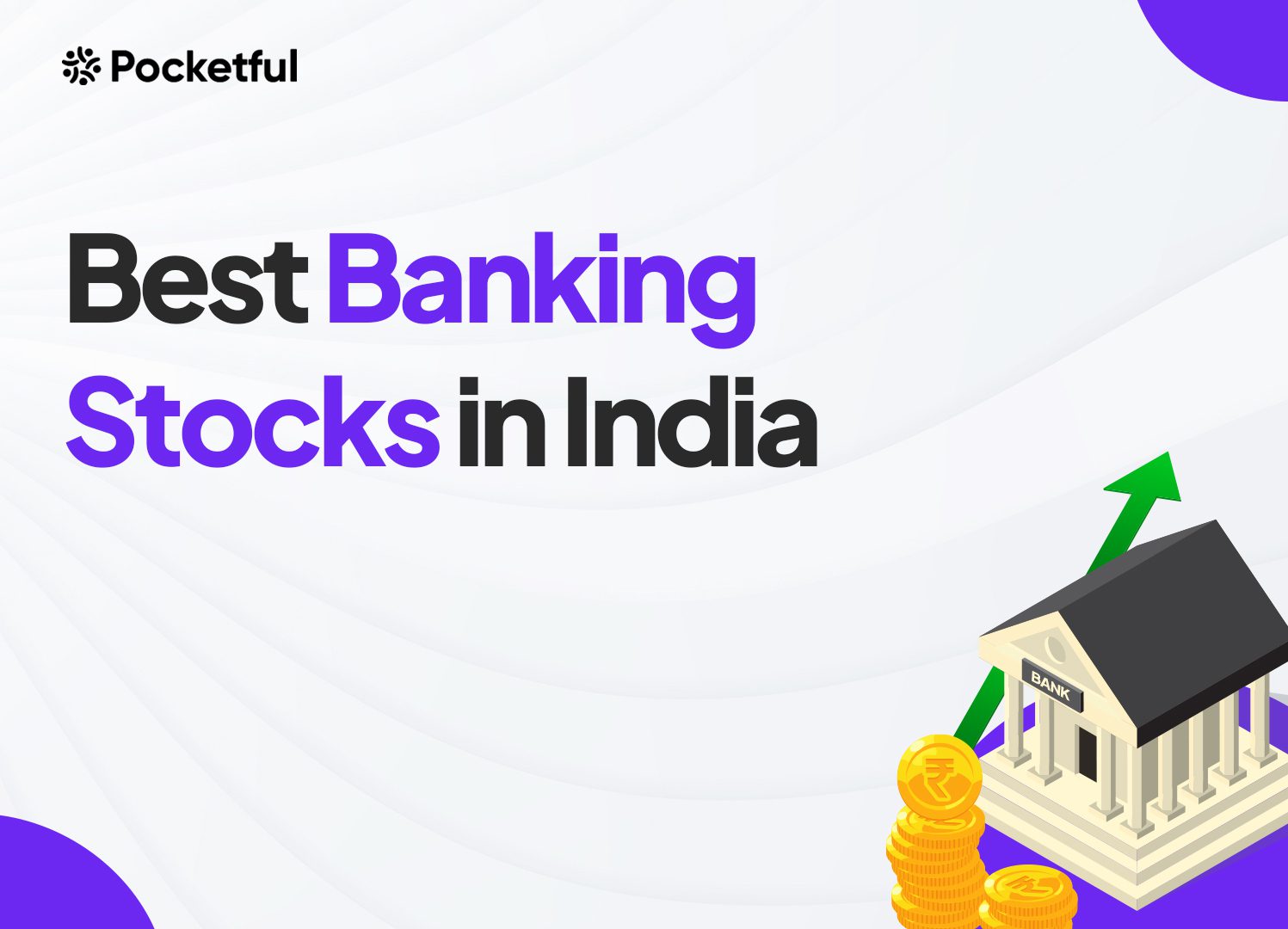| Type | Description | Contributor | Date |
|---|---|---|---|
| Post created | Pocketful Team | Aug-09-24 |

- Blog
- best banking stocks in india
List of Best Banking Stocks in India 2025

Today, every street corner has an ATM and digital payment systems are seamlessly woven into everyday transactions. Not only do banks provide a safe space to store your money, but they also offer a wide range of services to help you grow your wealth. From savings accounts and fixed deposits to loans and investment opportunities, they are the cornerstone of the Indian Financial system.
But with so many banking stocks available to invest in, how should an investor sort out the leading players in the banking industry? In this blog, we will discuss the best Indian banking stocks based on market capitalization and 1-year returns.
Overview of the Banking Sector in India

India’s banking sector is crucial for the economy and plays a vital role in financial inclusion and economic growth. The industry has experienced substantial transformation throughout the years. India has a large banking network that includes several types of banks, such as the public sector, private sector, and foreign banks. It is one of the world’s largest banking markets, serving a massive population. According to RBI, total deposits with banks as of May 2024 are approximately $ 2,452 billion. Public sector banks have always held a significant share of the banking industry, although private sector banks have gained prominence in recent years.
The Indian banking sector is classified into:
- Scheduled Banks: These banks are included in the Second Schedule of the Reserve Bank of India Act, 1934. They are further categorized into Public Sector Banks, Private Sector Banks, Foreign Banks, Regional Rural Banks, and Co-operative Banks.
- Non-Scheduled Banks: These banks are not included in the Second Schedule of the RBI Act and operate under different regulations than the scheduled banks.
Read Also: List of Government Bank Stocks/Share in India 2025
Best Banking Stocks Based on Market Capitalization
The top banking stocks in 2025 are:
| S.No. | Banking Stocks |
|---|---|
| 1 | HDFC Bank |
| 2 | ICICI Bank |
| 3 | State Bank of India |
| 4 | Kotak Mahindra Bank |
| 5 | Axis Bank |
The top banking stocks have been listed in descending order based on their market capitalization in the table below:
| Bank | Market Cap(in INR crore) | CMP (in INR) | 52-W High | 52-W Low |
|---|---|---|---|---|
| HDFC Bank Ltd. | 12,47,745 | 1,638 | 1,794 | 1,363 |
| ICICI Bank Ltd. | 8,20,737 | 1,166 | 1,258 | 899 |
| State Bank of India | 7,22,894 | 810 | 912 | 543 |
| Kotak Mahindra Bank Ltd. | 3,53,438 | 1,778 | 1,926 | 1,544 |
| Axis Bank | 3,49,977 | 1,132 | 1,340 | 921 |
Best Banking Stocks Based on Market Capitalisation – An Overview
The best banking stocks in India are given below, along with a brief overview:
1. HDFC Bank
HDFC Bank was among the first financial institutions in India to receive an ‘in principle’ approval from the Reserve Bank of India in 1994. The HDFC bank started its operations as a scheduled commercial bank in January 1995. The bank’s business philosophy is based on five core values: Operational Excellence, Customer Focus, Product Leadership, People, and Sustainability.
HDFC Ltd. or Housing Development Finance Corporation Ltd. was merged with HDFC Bank in 2022 in India’s largest-ever M&A deal. The bank provides a wide range of financial products and services, such as retail banking, wholesale banking, loans, credit cards, savings accounts, current accounts, investment products, etc.
2. ICICI Bank
ICICI Bank stands for Industrial Credit and Investment Corporation of India and is regarded as India’s second-largest private sector bank. The World Bank, Indian public-sector banks, and public-sector insurance companies initiated the establishment of ICICI through a joint venture with other businesses in 1955 as a part of their initiative to accelerate the economy’s industrial growth by providing them with long and medium-term financing. ICICI became the first Indian company and Asian bank other than Japanese Banks to be listed on the New York Stock Exchange (NYSE). In October 2001, the directors of ICICI and ICICI Bank approved the merger of its subsidiary businesses named ICICI Personal Financial Services Limited and ICICI Capital Services Limited with ICICI Bank.
3. State Bank of India (SBI)
SBI is India’s largest public sector bank, with a 23% market share. SBI is headquartered in Mumbai and holds a rich heritage of over 200 years.
The roots of SBI trace back to 1806 when the Bank of Calcutta was established, the first joint stock bank in British India. Bank of Calcutta was later renamed as Bank of Bengal. Three separate presidency banks, Bank of Bengal, Bank of Bombay, and Bank of Madras, emerged across British India during this period, which were later merged to form the Imperial Bank of India in 1921.
In 1955, the Reserve Bank of India acquired a controlling stake in the Imperial Bank of India and renamed it the State Bank of India. SBI later acquired various state-associated banks and commercial banks.
SBI has played an important role in bringing banking services to rural areas. Core values of the Bank – Service, Transparency, Ethics, Politeness and Sustainability.
4. Kotak Mahindra Bank
Kotak Mahindra Bank is a leading Indian banking and financial services company headquartered in Mumbai. It offers a wide range of banking products and financial services for corporate and retail customers. It is India’s third-largest private sector bank by market capitalization.
Kotak Mahindra Financial Services was founded in 1985 by Uday Kotak. In 1986, Anand Mahindra and his father, Harish Mahindra, invested in the company, which was subsequently renamed Kotak Mahindra Bank. The company was initially engaged in bill discounting and lease and hire-purchase activities. In 2003, Kotak Mahindra Bank became India’s first non-banking finance company to convert into a commercial bank.
5. Axis Bank
Axis Bank was initially established as UTI Bank by a joint venture between the Life Insurance Corporation of India, the Government of India, and other business houses. UTI Bank’s operations started in 1994 when the first branch in Ahmedabad was opened. In 2007, UTI Bank was renamed “Axis Bank”. It soon became a well-established and recognized bank in the Indian Banking sector. This was a turning point in the history of Axis Bank because it became an aggressive player with a focus on branch expansion and innovation. Additionally, Axis Bank consistently made an effort to diversify its product portfolio. The bank now offers a variety of financial products, including credit cards, savings accounts, current accounts, brokerage facilities, and retail banking.
Best Banking Stocks Based on 1-Year Return
| S.No. | Bank | 1-Year Return |
|---|---|---|
| 1 | Indian Overseas Bank | 135.40% |
| 2 | Dhanlaxmi Bank Ltd. | 100.51% |
| 3 | Central Bank of India Ltd. | 96.63% |
| 4 | Punjab & Sind Bank | 94.95% |
| 5 | UCO Bank | 89.08% |
Best Banking Stocks Based on 1-Year Return – An Overview
The best banking stocks according to 1-year return are given below, along with a brief overview:
Indian Overseas Bank
IOB is a well-known government-owned bank in India that was established in 1937. Founded by M. Ct. M Chidambaram Chettyar, a visionary entrepreneur who aimed to promote overseas banking and foreign exchange operations. In 1969, IOB was nationalized along with 14 other major banks in India. Today, IOB is a well-established bank with an extensive network of branches across India and a presence in several countries. It also has overseas branches in Singapore, Hong Kong, Thailand, and Sri Lanka.
Dhanlaxmi Bank
Dhanlaxmi Bank was established in 1927 in Thrissur, Kerala. Starting with a small capital of INR 11,000, the bank has grown significantly over the years. It became a scheduled commercial bank in 1977. The bank focuses on retail and SME lending and aims to be customer-centric. It has a significant presence in Kerala and is expanding its operations across India. The bank implemented digital initiatives to enhance customer experience and streamline operations. This includes investing in technological advancements to offer a wide range of digital banking services. Over the years, it has earned the trust and goodwill of clients.
Punjab & Sind Bank
Punjab & Sind Bank is a prominent public sector bank in India and was established in 1908. It was nationalized in 1980 and still plays an important role in India’s financial system. The bank was founded with a noble mission to empower the underprivileged. The bank provides a wide range of financial services, including personal banking, corporate banking, and international banking. Its commitment to social responsibility and financial inclusion continues to be a driving force behind its operations.
Central Bank of India Ltd.
Central Bank of India is a well-known government bank. The bank was founded in 1911 and is the first Indian commercial bank fully owned and managed by Indians. Sir Sorabji Pochkhanwala and Sir Pherozehshah Mehta created the bank to represent India’s increasing financial independence in the British Raj. The bank was nationalized in 1969. It has been important for India’s economic development for decades, helping many customers and contributing to the country’s banking system.
UCO Bank
UCO Bank is a well-recognized public sector bank in India that was established in 1943. It was established by renowned industrialist G.D. Birla as the United Commercial Bank. The bank played an important role in India’s economic development post-independence. In 1969, UCO bank was nationalized along with other major banks. This marked a turning point, leading to the expansion of the bank’s operations and a heightened focus on social banking. Over the years, UCO Bank has been a pioneer in implementing various welfare schemes and credit programs, empowering individuals and promoting inclusive growth in the country.
Key Performance Indicators (KPIs)
| Bank | Net Interest Margin (%) | CASA (%) | Capital Adequacy Ratios (%) | P/E (x) | P/B (x) |
|---|---|---|---|---|---|
| HDFC Bank Ltd. | 3.21 | 38.13 | 18.80 | 18.38 | 2.77 |
| ICICI Bank | 3.61 | 39.6 | 16.33 | 17.68 | 3.04 |
| State Bank of India | 2.66 | 39.92 | 14.28 | 10.50 | 1.87 |
| Kotak Mahindra Bank Ltd. | 4.47 | 52.77 | 21.80 | 16.33 | 2.71 |
| Axis Bank Ltd. | 3.38 | 42.96 | 16.63 | 13.15 | 2.26 |
| Indian Overseas Bank | 2.79 | 43.87 | 17.28 | 41.60 | 4.72 |
| Dhanlaxmi Bank Ltd. | 2.87 | 30.66 | 12.71 | 18.59 | 1.05 |
| Punjab & Sind Bank | 1.92 | 32.41 | 17.16 | 66.61 | 2.68 |
| Central Bank of India | 2.89 | 49.97 | 15.08 | 16.74 | 1.85 |
| UCO Bank | 2.50 | 37.45 | 16.98 | 16.45 | 2.56 |
Benefits of Investing in Banking Stocks

The benefits of investing in banking stocks are:
- Dividend Income – Banks often pay regular dividends to shareholders. This offers a stable income stream, which makes it particularly appealing to long-term investors.
- Hedge against Inflation – Bank stocks have been seen as protection against inflation. When inflation increases, banks can raise interest rates on loans and make more profit.
- Diversification – Adding banking stocks to your portfolio helps you reduce overall portfolio risk.
Factors to Consider Before Investing in Banking Stocks
An investor must consider the following factors before investing in banking stocks:
- Financial Performance – Analyze important financial ratios such as net interest margin, CASA, etc.
- Valuation – Investors should compare the bank’s valuation to its peers and judge its intrinsic value.
- Interest Rate – Rising interest rates generally benefit banks’ net interest margins, while falling rates can reduce profitability.
- Inflation – High inflation can erode the buying power and increase loan defaults, impacting the bank’s profitability.
Future of the Banking Industry
The banking industry is undergoing significant changes due to technological advancements and the evolving regulatory landscape. Banks use data analytics and artificial intelligence to offer customized financial products and services. These technological advancements have the potential to enhance fraud detection and prevention mechanisms, ultimately creating a more secure financial environment. More AI-powered chatbots and virtual assistants are being used for customer support and process automation. The RBI’s IFTAS cloud platform is also expected to strengthen the banking sector by enhancing the security, integrity and privacy of financial data.
Read Also: Small Finance Bank Share List in India 2025
Conclusion
To summarize, investors must thoroughly analyze banking stocks to ensure profitability. While these investments can give you lucrative returns, it is important to have a careful and well-thought-out investment plan. A thorough analysis of market trends and fundamental research can help investors make better decisions. It is advised to consult a financial advisor before investing.
Frequently Asked Questions (FAQs)
Is it good to invest in banking stocks in India?
While the future of the Indian banking sector is promising, the short-term performance is affected by the regulations and other market variables. Hence, it is important to consult a financial advisor before investing.
How can I identify good banking stocks?
Investors can analyze the financial performance, past returns, growth prospects and industry trends to identify banking stocks for investment purposes.
Should I invest in public or private sector banks?
Both the private and public sector banks offer good investment opportunities. Public sector banks may be more stable, while private sector banks offer high growth potential.
How much should I invest in banking stocks?
Diversification is important to reduce portfolio risk, and investors should allocate a suitable amount to banking stocks depending on the investor’s risk tolerance and investment goals.
What are the risks involved when investing in banking stocks?
Economic downturns, NPAs, interest rate fluctuations, and regulatory changes are major risks that an investor should be aware of before investing in banking stocks.
Disclaimer
The securities, funds, and strategies discussed in this blog are provided for informational purposes only. They do not represent endorsements or recommendations. Investors should conduct their own research and seek professional advice before making any investment decisions.